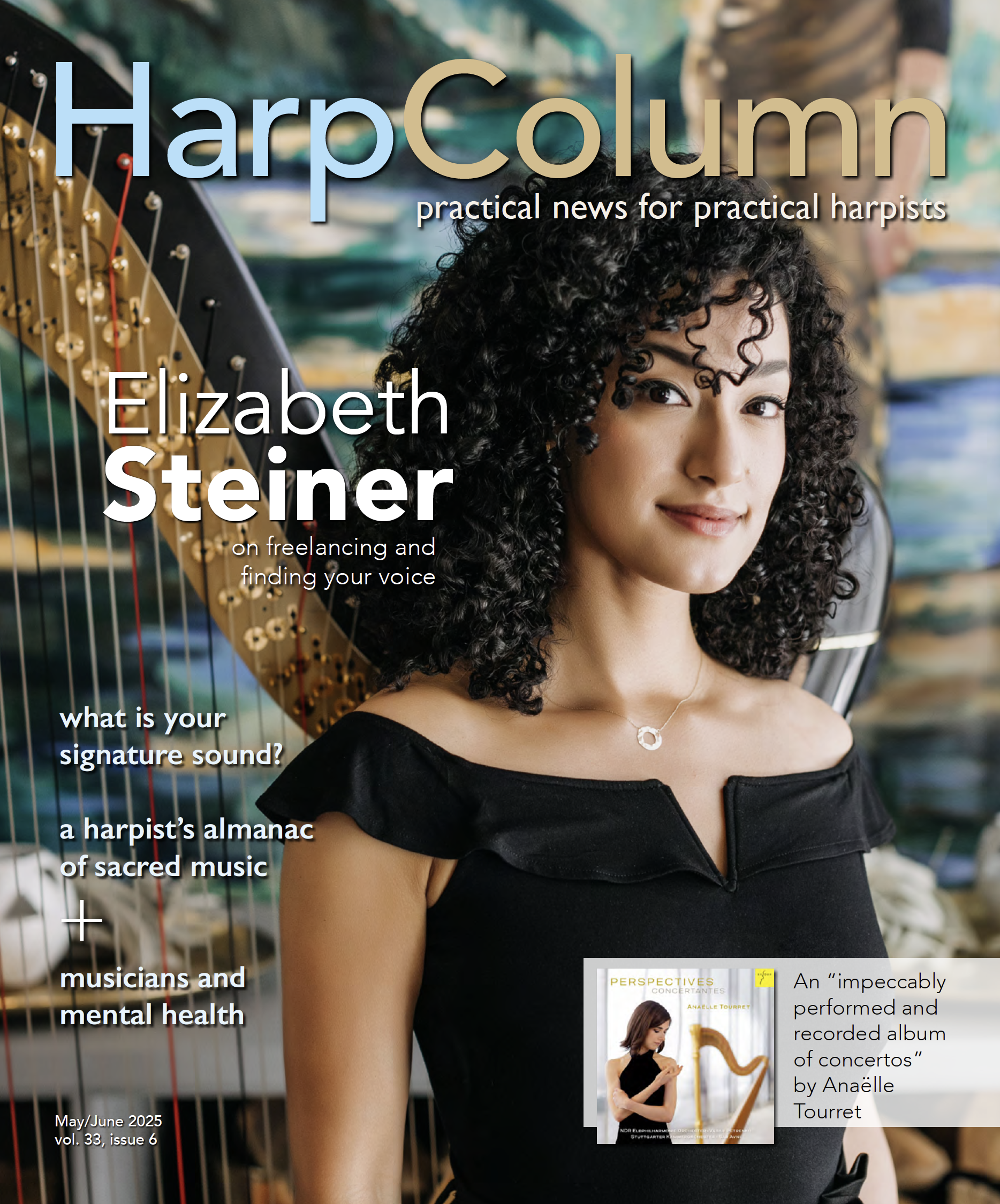Home › Forums › Teaching the Harp › Do adult amateurs have special problems learning harp?
- This topic has 45 replies, 16 voices, and was last updated 15 years, 10 months ago by
Briggsie B. Peawiggle.
-
AuthorPosts
-
September 4, 2008 at 2:30 pm #85713
diane-michaels
SpectatorOne of the qualities that adult students bring in to lessons which I relish most
September 4, 2008 at 3:23 pm #85714unknown-user
ParticipantEither Saul is at least partially right or my teacher collects more than the average number of head strong students.
When I started with her I frequently attempted to select (totally inappropriate) music, and learned to my dismay that there were things I could love to hear, but not play in the stage of learning I was in. Now I’ve found that some of the music I coveted is technically playable but poorly arranged and doesn’t sound good.
My teacher is extremely methodical and I have come to see that her planning is a blessing.
At present we are agreeing to disagree about going to pedal. Finger technique is not my strong suit on any instrument, and lever technique seems to me to slow the process even more, but I can’t deny that all of the work I do on lever will make the addition of pedals more satisfying. I also love some of the lever repertoire and wouldn’t want to miss it.
To paraphrase a biblical reference “The good harp teacher is worth more than silver or gold”.
September 5, 2008 at 3:17 am #85715unknown-user
ParticipantWell, perhaps I have just been a bit unlucky, however, I know other music teachers who have similar experiences.
September 5, 2008 at 10:43 am #85716unknown-user
ParticipantAnn, on choosing inappropriate music: my teacher and I work pretty much on the principle that I propose pieces to learn and she comments on the suitability of the choice.
September 5, 2008 at 7:31 pm #85717kay-lister
MemberI can only speak for myself as an adult student.
September 5, 2008 at 7:43 pm #85718kay-lister
MemberSorry – I was pretty much responding to Sauls statement of how adults definitely tend to have problems with how to relate to and respect their teachers.
September 5, 2008 at 9:35 pm #85719unknown-user
ParticipantStanding at attention and applauding for Kay!
September 5, 2008 at 10:38 pm #85720tony-morosco
ParticipantKay, beautifully said.
I don’t know or associate with many children, so most of the harpists, harpers, hapisters or what ever in my area I know are almost all adults who started playing as adults. They are each individuals who all approach the harp in their own way, and while harp playing is important to all of them it holds a different degree or place in each of their lives.
Some of them, despite having started later in life, managed to turn professional even.
Adult learners face different challenges. Learning at an older age actually can be harder. Music is a language and language acquisition skills decrease as we age, just a simple fact of nature. Adults have jobs, family responsibilities, community responsibilities and other important things that most children don’t have to deal with. Yet most of the adult learners I know manage to be serious and dedicated to their pursuit of playing the harp despite that.
Personally I am inspired by those adult learners I know. They remind me that I am never too old, and that despite the special challenges that the passing years heap on me I can do the things I want if I am focused and dedicated enough.
While I am sure there are some individuals out there who are difficult cases for their teachers overall I have to take my hat off to those adults who overcome the challenges, and the self doubt over starting something so challenging and different at a later age, and go on to pursue their interests and dreams.
September 6, 2008 at 8:49 pm #85721unknown-user
ParticipantI know of no study that indicates language acquistion skills necessarily decrease as we age and that leads me to query whether there’s any actual evidence that music skills do.
September 7, 2008 at 1:52 am #85722carl-swanson
ParticipantNina- I taught English as a foreign language to French businessmen for two years when I lived in France. The course was intensive-8 hours a day for two weeks, 6 days a week. The men were generally in their 30’s to 50’s. I saw a whole range of ability there, from men who picked it up very fast to men who could hardly learn anything in that two weeks. The best student I ever had was a North African man who was maybe 30 years old when I taught him. Every word he learned he could pronounce without a trace of accent immediately. He grasped sentence structure right away and was a delight to teach. The worst student I had, and he had already worn out 5 or 6 teachers before me, was a self made millionaire who was probably in his early 60’s. I didn’t do any better with him than any of the other teachers.
The point is, I believe there are stages of life when certain things can be learned more easily than at others. Once someone has reached adulthood, then the ability to learn something is very individual, with some doing very well, like your mother, and others doing not so well. Children, especially very young children, pick up language much faster in general and at about the same speed as a group than adults. This isn’t surprising. In physical terms, there are windows of opportunity through childhood. If a child is born with a wall eye, the eye has to be repaired before the age of 4 or it will never see correctly, even if operated on later on. So maybe there are stages of life when certain skills can be learned in general easier than at other stages.
September 7, 2008 at 5:26 am #85723tony-morosco
ParticipantNina,
I would suggest reading the studies done by Eric Lennenberg and
September 7, 2008 at 5:37 am #85724tony-morosco
ParticipantCarl,
Your example of wall eye reminds me of a study done on kittens. Kittens were taken and each raised in a room with only vertical lines for the firsts year of their life. When removed from that single environment they were unable to navigate correctly and when put in a room with all horizontal lines they tested the same as kittens who were blind.
They never developed the ability to see normally after that. The elasticity of the brain decreases with age. There are numerous cases where young people who suffered brain damage were able to compensate over time while adults with similar damage were unable to. The younger we are the easier it is for other parts of the brain to take over for damaged parts, and this gets more difficult as we get older. It is just the physical effects of aging on the brain.
September 7, 2008 at 6:36 pm #85725unknown-user
ParticipantKay, in misstating my premise, you exaggerate it completely. I am talking about certain adults, a specific type of personality, not all adults, nor most, and I have no problem teaching adults. I have just had a couple of students who were perhaps immature.
July 6, 2009 at 2:19 am #85726nancy nitta
ParticipantIn my own case, I think I just want to jump in and learn a song despite the level of difficulty – because to work on learning a song I love, gives me the inspiration and fortitude to keep at it. I must feel inspired! Also, in mid-life you realize how short life is and you just want to spend your free time doing what you love.
July 6, 2009 at 2:58 pm #85727Misty Harrison
ParticipantMy adult students learn very quickly but I do make sure they learn very easy repertoire to begin with and then proceed to whatever they are working on next. I think adults expect to be at adult levels because they’re adults! But when you’re first starting something you have to be reminded that you cna’t start at the adult (meaning advanced) level. You have to pretend to be a kid again and move up to being an adult.
The only problem I ever notice is adult students that seem to want to play the instrument but then claim that they never have any time to practice and have a million excuses.
It’s understandable that they’re busy and practice time is hard to find, but I am talking about people who come and say well I can’t practice because x, y, and z, and then when you offer suggestions, they simply find another excuse, oh yes but that won’t really work because a, b, c.
This is a much bigger problem I have noticed. Also if the student backs off from big repertoire and actually succeeds in learning some small peices then they usually propel forward because they have more confidence that making practice time actually pays off.
If not they often seem to put off practicing because it just reminds them that they haven’t accomplished their pieces yet.
-
AuthorPosts
- You must be logged in to reply to this topic.






